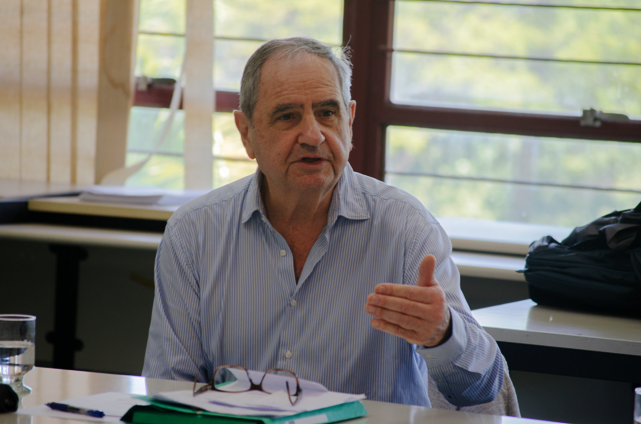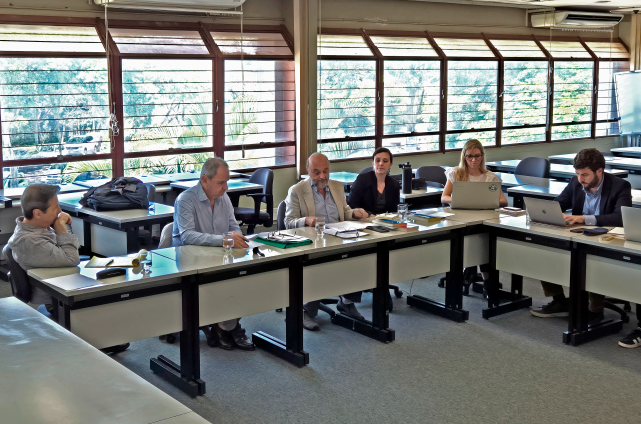
Pierre Rosanvallon highlighted the role of customs, practices, and values in structuring the democratic order.
Photo: Gustavo Luiz – IEAT/UFMG
French historian Pierre Rosanvallon, holder of the IEAT Darcy Ribeiro Chair: Sovereignty, Education and Politics, participated in an internal seminar held on November 19, 2025, in the COPEVE/UFMG auditorium, in Administrative Unit 3.
In addition to Rosanvallon, the seminar featured presentations by Enrique Peruzzotti, from the Department of Political Science and International Studies at Torcuato Di Tella University in Argentina, and Professor Leonardo Avritzer from the Department of Political Science (DCP) at Fafich and coordinator of the IEAT Darcy Ribeiro Chair.
Combining the presentation of the French political scientist’s ideas with dialogue on the work of the researchers present, the seminar aimed to discuss central issues in contemporary democratic theory.
Morning: The Invisible Institutions of Democracy
The seminar was opened by Pierre Rosanvallon, who presented the central ideas of his most recent book, Invisible Institutions, published in 2024. In his presentation, the professor highlighted three invisible, yet fundamental, pillars of all democracies: trust, legitimacy, and authority. According to Rosanvallon, trust functions fully only in small groups. In complex societies, he argued, it necessarily depends on institutions capable of reducing uncertainties and producing “proofs” of reliability. Legitimation, in turn, arises from this production of trust, while democratic authority must combine strength and non-authoritarianism – a delicate but essential balance. The subsequent debate highlighted an important criticism: political science has treated the concept of institution in an excessively narrow way, ignoring customs, practices, and values that also structure the democratic order. The fundamental distinction between legality and legitimacy, participants observed, has been lost amidst the excessive focus on elections, impoverishing our understanding of current crises. In a context marked by misinformation and uncertainty, invisible institutions function as reducers of complexity and prove decisive in containing authoritarian tendencies and sustaining popular sovereignty.

Participants of the internal seminar of the IEAT Darcy Ribeiro Chair: Sovereignty, Education and Politics
Photo: Gustavo Luiz – IEAT/UFMG
Afternoon: From democratization to backsliding
The afternoon session featured two presentations of academic papers, both commented on by Professor Rosanvallon. Professor Enrique Peruzzotti opened the discussions with his paper “From Democratization to Backsliding: A Shifting Focus in Third-Wave Democratic Theory.” In his analysis, Peruzzotti traced the trajectory of democratic theory since the third wave of democratization, showing how it migrated from an expansive and transformative vision – centered on popular sovereignty, accountability, and institutional innovation – to a growing concern with democratic backsliding.
Peruzzotti’s central argument is that the current focus on containing erosion can dangerously narrow democratic theory, placing institutional stability above democratic transformation. Proposing a change of perspective, he suggests that, instead of treating crises merely as setbacks, we should understand them as “turbulences” that also open space for reinvention. Faced with new social and technological complexities, he argues that democratic theory needs to recover its critical and innovative impulse and not just protect the status quo.
Next, Professor Leonardo Avritzer presented considerations on his paper “La contención del backsliding: los roles de diferentes actores en la contención de la erosión democracia” (The Containment of Backsliding: The Roles of Different Actors in Containing Democratic Erosion). The work discusses how different Latin American countries have managed to contain processes of democratic backsliding, arguing that containing democratic erosion depends not only on parliament, but also on the institutional design of supreme courts and the role of the opposition, including its extra-institutional forms of action.
Through a comparative analysis involving Colombia, Venezuela, Brazil, and Mexico, Avritzer demonstrated that countries with judiciaries strengthened by “new constitutionalism”—such as Brazil and Colombia—had a greater capacity to restrain autocratic leaders. In contrast, contexts with captured courts (Venezuela) or vulnerable to governing majorities (Mexico) favored authoritarian advances. The Brazilian case received special attention in the presentation, highlighting the combined importance of the Supreme Court, mobilized civil society, and a conciliatory opposition in preventing Bolsonarism from advancing from institutional erosion to an attempted coup.
Both presentations received feedback and comments from Professor Rosanvallon, enriching the debate with his comparative perspective and expertise on contemporary transformations in democracy.
Participants in the seminar included Eduardo Soares Neves, Deputy Pro-Rector for Graduate Studies at UFMG; Patrícia Kauark, Director of IEAT; Leonardo Avritzer, from the Department of Political Science (DCP) at Fafich and coordinator of the IEAT Darcy Ribeiro Chair; Marcus Abílio Pereira, also from DCP; Carlo Gabriel Pancera, Helton Adverse, Newton Bignotto, and Vitor Sommavilla, all affiliated with the Department of Philosophy at Fafich; and Júnia Furtado from the Department of History at Fafich. The meeting also included the participation of Miguel Lago, political scientist and executive director of the Institute for Health Policy Studies (Ieps), and researchers affiliated with the IEAT Darcy Ribeiro Chair: Anna Luiza Coli, Stella Gontijo, and Gabriel Avritzer.
IEAT Darcy Ribeiro Chair
Created in 2024, the IEAT Darcy Ribeiro Chair: Sovereignty, Education and Politics aims to promote transdisciplinary dialogue around themes that reflect urgent issues for contemporary Brazil, guiding debates on national sovereignty, the strengthening of the educational system, and the consolidation of inclusive and just public policies. The initiative has the institutional support of Minas Gerais congressman Patrus Ananias, through the allocation of resources via parliamentary amendment.